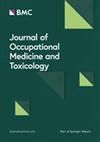在德国从事医疗保健和社会服务工作的人员中,原有病症对后柯塞韦综合征严重程度的影响
IF 2.7
4区 医学
Q2 PUBLIC, ENVIRONMENTAL & OCCUPATIONAL HEALTH
Journal of Occupational Medicine and Toxicology
Pub Date : 2024-08-01
DOI:10.1186/s12995-024-00431-8
引用次数: 0
摘要
目前,人们还不完全了解后COSVID综合症(PCS)的基本机制。在一般人群中,已有病症被描述为导致严重 PCS 的风险因素,但缺乏针对不同职业群体的相关数据。本研究旨在调查在医疗保健和社会服务人员这一职业群体中,原有病症对严重后COVID综合征的影响。研究分析了一项纵向观察研究的基线数据。2021 年 2 月,对 2020 年感染过 COVID-19 的医护人员进行了有关感染后遗症的调查。对至少有一种持续症状被归类为严重 PCS 的影响因素进行了多变量逻辑回归分析。在总共 2053 名参与者中,21.5% 的人患有严重 PCS。呼吸系统疾病(OR 1.94;CI 1.44-2.61)、心血管疾病(OR 1.35;CI 1.04-1.77)和泌尿生殖系统疾病(OR 1.79;CI 1.10-2.91)是导致严重 PCS 的风险因素。呼吸系统疾病和精神疾病对持续疲劳/疲惫、注意力不集中/记忆力减退和呼吸急促的严重程度有显著的统计学影响。泌尿生殖系统疾病与严重疲劳/精疲力竭有关。女性、吸烟、体育锻炼和因感染 COVID-19 而住院也是导致严重 PCS 的重要风险因素。在医疗保健和社会服务领域工作的人员如果原有疾病缠身,可能会面临更高的患严重 PCS 的风险。作为纵向研究的一部分进行的其他分析将显示这一结果是否以及如何随着时间的推移而发生变化。本文章由计算机程序翻译,如有差异,请以英文原文为准。
Impact of pre-existing conditions on the severity of post-COVID syndrome among workers in healthcare and social services in Germany
The underlying mechanisms of post-COVID syndrome (PCS) are still not fully understood. While pre-existing conditions have been described as a risk factor for severe PCS in the general population, data specific to different occupational groups in this context is lacking. This study aimed to investigate the impact of pre-existing conditions on severe post-COVID syndrome among the occupational group of healthcare and social services employees. Baseline data from a longitudinal, observational study were analysed. In February 2021, health workers who had a COVID-19 infection in 2020 were surveyed about sequelae of the infection. Factors influencing severe PCS with at least one persistent symptom categorised as severe were subjected to a multivariate logistic regression analysis. Of a total of 2,053 participants, 21.5% had severe PCS. Underlying respiratory (OR 1.94; CI 1.44–2.61), cardiovascular (OR 1.35; CI 1.04–1.77) and urogenital (OR 1.79; CI 1.10–2.91) disease were risk factors for severe PCS overall. Respiratory and mental illnesses had a statistically significant impact on persistent fatigue/exhaustion, concentration/memory difficulties and shortness of breath categorised as severe. Urogenital disease was associated with severe fatigue/exhaustion. Other significant risk factors for severe PCS were female sex, smoking, physical exercise and hospitalisation due to COVID-19 infection. Workers in healthcare and social services with pre-existing conditions may face a higher risk of developing severe PCS. Additional analyses performed as part of the longitudinal study will show if and how this result changes over time.
求助全文
通过发布文献求助,成功后即可免费获取论文全文。
去求助
来源期刊

Journal of Occupational Medicine and Toxicology
PUBLIC, ENVIRONMENTAL & OCCUPATIONAL HEALTH-
CiteScore
6.00
自引率
0.00%
发文量
23
审稿时长
19 weeks
期刊介绍:
Aimed at clinicians and researchers, the Journal of Occupational Medicine and Toxicology is a multi-disciplinary, open access journal which publishes original research on the clinical and scientific aspects of occupational and environmental health.
With high-quality peer review and quick decision times, we welcome submissions on the diagnosis, prevention, management, and scientific analysis of occupational diseases, injuries, and disability. The journal also covers the promotion of health of workers, their families, and communities, and ranges from rehabilitation to tropical medicine and public health aspects.
 求助内容:
求助内容: 应助结果提醒方式:
应助结果提醒方式:


